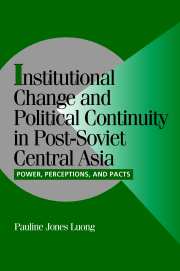 Institutional Change and Political Continuity in Post-Soviet Central Asia
Institutional Change and Political Continuity in Post-Soviet Central Asia Book contents
- Frontmatter
- Contents
- Tables and Figures
- Note on Transliteration
- Acronyms
- Acknowledgments
- 1 THE CONTINUITY OF CHANGE: OLD FORMULAS AND NEW INSTITUTIONS
- 2 EXPLAINING INSTITUTIONAL DESIGN IN TRANSITIONAL STATES: BEYOND STRUCTURE VERSUS AGENCY
- 3 SOURCES OF CONTINUITY: THE SOVIET LEGACY IN CENTRAL ASIA
- 4 SOURCES OF CHANGE: THE TRANSITIONAL CONTEXT IN CENTRAL ASIA
- 5 ESTABLISHING AN ELECTORAL SYSTEM IN KYRGYZSTAN: RISE OF THE REGIONS
- 6 ESTABLISHING AN ELECTORAL SYSTEM IN UZBEKISTAN: REVENGE OF THE CENTER
- 7 ESTABLISHING AN ELECTORAL SYSTEM IN KAZAKHSTAN: THE CENTER'S RISE AND THE REGIONS' REVENGE
- 8 INSTITUTIONAL CHANGE THROUGH CONTINUITY: SHIFTING POWER AND PROSPECTS FOR DEMOCRACY
- Appendix I Sample Interview Questions
- Appendix II Career Patterns of Regional Leaders in Soviet and Post-Soviet Central Asia
- References
- Index
8 - INSTITUTIONAL CHANGE THROUGH CONTINUITY: SHIFTING POWER AND PROSPECTS FOR DEMOCRACY
Published online by Cambridge University Press: 02 September 2009
- Frontmatter
- Contents
- Tables and Figures
- Note on Transliteration
- Acronyms
- Acknowledgments
- 1 THE CONTINUITY OF CHANGE: OLD FORMULAS AND NEW INSTITUTIONS
- 2 EXPLAINING INSTITUTIONAL DESIGN IN TRANSITIONAL STATES: BEYOND STRUCTURE VERSUS AGENCY
- 3 SOURCES OF CONTINUITY: THE SOVIET LEGACY IN CENTRAL ASIA
- 4 SOURCES OF CHANGE: THE TRANSITIONAL CONTEXT IN CENTRAL ASIA
- 5 ESTABLISHING AN ELECTORAL SYSTEM IN KYRGYZSTAN: RISE OF THE REGIONS
- 6 ESTABLISHING AN ELECTORAL SYSTEM IN UZBEKISTAN: REVENGE OF THE CENTER
- 7 ESTABLISHING AN ELECTORAL SYSTEM IN KAZAKHSTAN: THE CENTER'S RISE AND THE REGIONS' REVENGE
- 8 INSTITUTIONAL CHANGE THROUGH CONTINUITY: SHIFTING POWER AND PROSPECTS FOR DEMOCRACY
- Appendix I Sample Interview Questions
- Appendix II Career Patterns of Regional Leaders in Soviet and Post-Soviet Central Asia
- References
- Index
Summary
Far from a decisive break with the past, the design of electoral systems in Kazakhstan, Kyrgyzstan, and Uzbekistan clearly demonstrates that these Central Asian states continued to embrace certain features of their shared Soviet legacy following independence. In particular, the predominance of regional political identities directly influenced the process by which each state established this new institution. All three engaged in bargaining games characterized by regionally based actors, preferences, and conceptualizations of power and power relations. While the continued salience of regionalism among Central Asian leaders did not preclude some institutional change in these states, and indeed, produced significant variation in their respective electoral systems and corresponding rates of political liberalization, it acted as a strong impediment to more fundamental institutional, and hence, regime change. Perceived shifts in relative power among established actors during their respective transitions made institutional innovation and change possible in Kazakhstan, Kyrgyzstan, and Uzbekistan. In none of these three states, however, was the transition's impact on power relations believed to be dramatic enough to compel them to support a unilateral change in institutions. Rather, established elites constructed institutions that deliberately reconfigured the previous division of political influence without disrupting the widely recognized basis for allocating power and privilege. This amounted to what I call “pacted stability” – a form of elite pact making in which the primary aim is maintaining the exclusive nature of decision making rather than expanding the political process to accommodate new and/or previously excluded interests.
- Type
- Chapter
- Information
- Institutional Change and Political Continuity in Post-Soviet Central AsiaPower, Perceptions, and Pacts, pp. 253 - 279Publisher: Cambridge University PressPrint publication year: 2002


